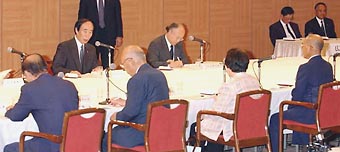
At the press conference after the Peace Memorial Ceremony and at the "meeting to hear demands from survivor representatives," Health, Labor and Welfare Minister Chikara Sakaguchi stated that the relief measures for overseas hibakusha started this year "would not be the end of it." While agreeing to consider expansion, he sought understanding for responding within the present framework of assistance projects.
National efforts to assist overseas hibakusha include funds for coming to Japan to receive treatment and funds to cover the cost of the stay, but many criticize these provisions as inadequate.
The leaders of seven hibakusha organizations attended the "listening meeting" in a hotel in Naka-ku, Hiroshima. Sunao Tsuboi, acting secretary general of the Hiroshima Survivors Federation, said, "Hibakusha are hibakusha, wherever they are. The relief laws should apply to all." Li Sil Gun, leader of a group of pro-Pyongyang Korean atomic bomb survivors, spoke for survivors in North Korea. "With no diplomatic relations, in reality, it is impossible for them to come to Japan for treatment. Furthermore, emotionally, this is not something people in victimized nations should have to come to the perpetrator nation to ask for." He called for concrete relief measures such as building a hospital.
In response, Minister Sakaguchi said, "We cannot offer different measures to each country." He did display sympathy for the elderly hibakusha, admitting that coming to Japan is an ordeal. "If they can't come here, we can go there and consult with them." He indicated the possibility of certifying them as survivors and offering medical examinations in their countries.
With respect to improving relief for second and third generation survivors, he expressed his belief that, "At this point, no genetic effect on the next generation has been found, but it is necessary to continue the investigation to make sure no effect emerges with age." Responding to the criticism that the standards for certifying an A-bomb-related disease are too strict, he said, "We want to make it as easy as possible, but we do have to scientifically and objectively establish a cause-effect relationship to A-bomb radiation. We are now in the process of revising the DS86 method (for estimating radiation exposure dose), and we intend to make decisions based on epidemiological studies."
(Caption)Health, Labor, and Welfare Minister Chikara Sakaguchi at the "meeting to hear demands from survivor representatives" explaining his ideas about relief measures for overseas hibakusha (background left)
    
|